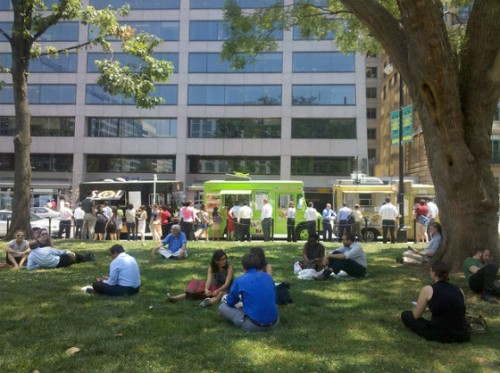HOUSTON, TX – A food fight is emerging in Houston between the local restaurant lobby and mobile operators. Food truck vendors are looking for relief from a set of city operating rules crafted to protect the interests of downtown restaurant owners.
What seems like a micro-local issue has far bigger ramifications. Beneath the greasy smokescreen of arguments about safety or terrorism (yes, terrorism), hides a very simple question that Houston City Council will have to answer. Is it right for the city to explicitly promote one safe, responsible business model over another?
These are not the food trucks I used to welcome while working at the junkyard or on a construction site. In recent years, innovative chefs have developed a new business model around the old concept, radically lowering the capital requirements to enter the business. This means that chefs can make a living on a far lower turnover, freeing them to experiment with ingredients, products, and quality in ways that the relatively high-capital standard restaurant model made impossible.
Liberated from the pressure to deliver bland, mass market fare at high-volume, more chefs are becoming business owners in their own right, earning a living producing high-quality, gourmet food at remarkably low prices. This innovation is shaking up the restaurant industry and inspiring efforts at protective regulation in cities all over the country.
The food trucks do present some regulatory challenges for local governments, but none of them are particularly difficult. A mobile kitchen requires a different approach for sanitation and fire inspection. Their potential to disrupt traffic has to be considered. And ownership turnover can create sales tax collection headaches. Those problems can, and are, addressed fairly easily in other places.
Los Angeles has managed to maintain safety with some of the loosest rules for any major metro. Chicago has a tough set of food truck regulations, but still allows more locations, more concentration, and doesn’t include Houston’s absurd requirement that groups of food trucks downtown keep a fire marshal onsite.
At issue is whether one set of honest, hard-working small business owners with capital invested in their brick and mortar restaurants should get protection by the city against another set of hard-working small business owners armed with an innovative new business plan. That’s it. The rest of the arguments are noise.
This food fight includes no legitimate regulatory concerns. No one is trying to gain a competitive advantage from pollution, public harm, or some other moral hazard. What makes this regulatory fight unique is its unusual zero-sum character.
Find the entire article at chron.com <here>




